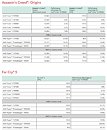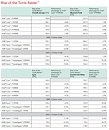Saturday, October 13th 2018

New PT Data: i9-9900K is 66% Pricier While Being Just 12% Faster than 2700X at Gaming
Principled Technologies (PT), which Intel paid to obtain some very outrageous test results for its Core i9-9900K eight-core processor launch event test-results, revised its benchmark data by improving its testing methodology partially. Initial tests by the outfit comparing Core i9-9900K to the Ryzen 7 2700X and Ryzen Threadripper 2950X and 2990WX, sprung up false and misleading results because PT tested the AMD chip with half its cores effectively disabled, and crippled its memory controller with an extremely sub-optimal memory configuration (4-module + dual-rank clocked high, leaving the motherboard to significantly loosen up timings).
The original testing provided us with such gems as the i9-9900K "being up to 50 percent faster than 2700X at gaming." As part of its revised testing, while Principled Technologies corrected half its rookie-mistakes, by running the 2700X in the default "Creator Mode" that enables all 8 cores; it didn't correct the sub-optimal memory. Despite this, the data shows gaming performance percentage-differences between the i9-9900K and the 2700X narrow down to single-digit or around 12.39 percent on average, seldom crossing 20 percent. This is a significant departure from the earlier testing, which skewed the average on the basis of >40% differences in some games, due to half the cores being effectively disabled on the 2700X. The bottom-line of PT's new data is this: the Core i9-9900K is roughly 12 percent faster than the Ryzen 7 2700X at gaming, while being a whopping 66% pricier ($319 vs. $530 average online prices).This whopping 12.3% gap between the i9-9900K and 2700X could narrow further to single-digit percentages if the 2700X is tested with an optimal memory configuration, such as single-rank 2-module dual-channel, with memory timings of around 14-14-14-34, even if the memory clock remains at DDR4-2933 MHz.
Intel responded to these "triumphant" new numbers with the following statement:
The entire testing data follows:
Source:
Principled Technologies (PDF)
The original testing provided us with such gems as the i9-9900K "being up to 50 percent faster than 2700X at gaming." As part of its revised testing, while Principled Technologies corrected half its rookie-mistakes, by running the 2700X in the default "Creator Mode" that enables all 8 cores; it didn't correct the sub-optimal memory. Despite this, the data shows gaming performance percentage-differences between the i9-9900K and the 2700X narrow down to single-digit or around 12.39 percent on average, seldom crossing 20 percent. This is a significant departure from the earlier testing, which skewed the average on the basis of >40% differences in some games, due to half the cores being effectively disabled on the 2700X. The bottom-line of PT's new data is this: the Core i9-9900K is roughly 12 percent faster than the Ryzen 7 2700X at gaming, while being a whopping 66% pricier ($319 vs. $530 average online prices).This whopping 12.3% gap between the i9-9900K and 2700X could narrow further to single-digit percentages if the 2700X is tested with an optimal memory configuration, such as single-rank 2-module dual-channel, with memory timings of around 14-14-14-34, even if the memory clock remains at DDR4-2933 MHz.
Intel responded to these "triumphant" new numbers with the following statement:
Given the feedback from the tech community, we are pleased that Principled Technologies ran additional tests. They've now published these results along with even more detail on the configurations used and the rationale. The results continue to show that the 9th Gen Intel Core i9-9900K is the world's best gaming processor. We are thankful to Principled Technologies' time and transparency throughout the process. We always appreciate feedback from the tech community and are looking forward to comprehensive third party reviews coming out on October 19.The media never disputed the possibility of i9-9900K being faster than the 2700X. It did, however, call out the bovine defecation peddled as "performance advantage data."
The entire testing data follows:













322 Comments on New PT Data: i9-9900K is 66% Pricier While Being Just 12% Faster than 2700X at Gaming
AMd really screwed the launch of Ryzen and X370, sending reviewers out ram kits that weren't Samsung-B with the boards and CPUs in the launch kits, but me, I had tonnes of ram to choose from, and was maybe he only reviewer that used those memory chips for a launch article, and ended up giving ASRock's Taichi board a 10/10 because it worked so well, when everyone else was struggling with their ASUS boards and complaining.
Like don't get me wrong, I think Intel is right to charge so much for their chips, but a big part of that is that those that don't want to pay those prices do have the option of buying an AMD rig for far less. Like I posted earlier, we should be thanking Intel for making AMD look so much better!
That's what I have serious a problem with, the market leader today can charge whatever they want & basically get away with it. The likes of Apple, Intel, Nvidia et al can charge obscene amounts of money, exploit slave labour, hazardous working conditions, economies of scale & even trade wars to basically suck out a disproportionate amount of money from the normal user that it's insane, thinking about the piles of cash they have. You're saying Intel is undercharging, how do you explain their ever increasing profits then?
Lastly I see this phrase often times repeated these days, what's "entitled to" supposed to mean in this case? Shouldn't corporations be held accountable to a particular standard, are they entitled to "free money" or no/less scrutiny in perpetuity?
It's when you don't have a choice that these things should be a problem.
Yet while I do hear where you are coming from, I maybe don't agree that Intel has any requirement to met the needs of everyone. Those that don't like what they do can spend their dollars on other products. That's the benefit of there not being a true monopoly, and why price fixing is illegal. Otherwise, it's all fair game and a company can set whatever price they like for their products, like NVidia has seemingly done with the ultra-expensive RTX 2080 TI. That pricing will force some people elsewhere, and that's perfectly OK.
Isn't it incredibly ironic?!
Shocking.
2700 € 278,
9700K € 499
Can € 231 buy me 2080Ti instead of 2080. Not today. 1080Ti instead of 1080. But 2070 is closer to Ti, so there is no faster card that is wort it.
i7-9700K, i5-9600K, i7-8700K, i7-8700 and i5-8600K are all better choices for gaming and overall than 2700/X.
And for gaming-only with no OC, i5-8400 and i5-8500 would offer great value at $182, while offering better gaming performance than AMD can offer.
Silly quick poll :slap:
both gpu and cpu wise the "best" is now better than it needs to be and people that want it are gonna have to shell out a fair bit more for it.. luckily there are perfectly adequate less costly gaming options..
trog
AMD did it nicely this time ... Intel on the other hand is releasing an over expensive CPU with no incentive whatsoever other than "hey look our box is more impressive in the mainstream than their HEDT" (*stomping their feet on the ground* +100$ to the price.) "hey look in our benchmark we are way faster" (*stomping their feet on the ground pointing at the result, and paying some review or asking for some very specific settings* +100$ to the price.) well ... now we know from where come the 200$ too much their top dog cost :laugh:depend the country pricing tho ... for me a 2600X or 2700X would be an obvious choice over a 9700K doe to pricing being probably above a 2700X (since it's probably the 9600K that will cost like a 2700X ) or even a 1XXX over a i3 :laugh:
I'm looking for a new cpu, mbo and mem for my wife, but with that and the Price only beeing 50$ deferent 2700x+3200mem vs 9700k+2666mem i will go for the less likely to be a fail in my wifes eyes.
Happy wife, happy life Intel 4 Life :D
There are way too many people on this forum and elsewhere that suffer from this disease called 'entitlement'. What it means? 'I used to buy this sort of CPU for amount X a number of years ago, so I should be able to do the same today' is one example of it. Entitlement means ignoring every circumstance but your own desires to convince yourself of some twisted truth.
That is exactly what happens on GPU since Pascal and the mining craze and it also happens Intel CPUs because there are cheaper alternatives. Ignoring the fact that Intel still has a performance crown and charges premium for it, because 'I used to be able to buy an i7 in the Haswell days and that was the best Intel had, too'. For GPU: entitlement is why people end up ignoring obvious 'too good to be true' situations and buy cheap knock-offs that turn out to be fakes or half broken cards. And get mad at Nvidia for exploiting their current position. Realistically, though, if you want to get what you want at a lower price, you need to simply not buy something. Restraint is fast becoming a rare quality these days. And whenever you say such a thing, a bunch of people will respond with 'but others will buy it anyway so what's the point' - thát is entitlement (or 'fear of missing out'). Others buy it, so why should I miss out? Why can they have what I can't?
Accountability applies to responsibilities. Entitlement applies to desire. And none of us 'need' this hardware to live. Intel has no 'responsibility' to provide us with a product that is reasonably priced for anyone's (realistic or not) standards.
Ironically, you don't even 'need' an Intel 9900K to play games, not even remotely close. You can suffice with far cheaper alternatives and still have a rig that lasts 5 years+. Spoiler: its still not going to be a 2700X as the optimal choice - not even when perf/dollar is your concern. This whole topic title is wrong on so many levels.